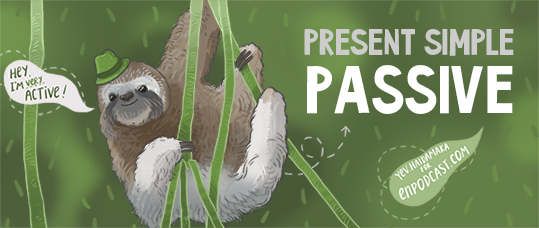Present Simple Passive
One of the typically difficult topics for students in the English language is Passive. It can be used in a variety of different tenses, but in this podcast we will focus on Present Simple Passive.
Let's look at these examples, paying attention to the verb in each of them:
Fresh milk is brought to us two times a week.
Traditionally, presidential elections are held every 4 years.
The best pizza is cooked in Italy.
So what do the verbs in these sentences have in common? Correct- they all have the verb be and the third form of the verb after it (is bought, are held, is cooked).
So, Present Simple Passive is be + V3
Let's consider a few more examples and try to find Present Simple Passive in them:
Coffee is grown in Brazil.
Where is the passive in this sentence? Correct - is grown.
In my family, the housework is done by my mom.
And where is the passive here? Correct – is done.
Both English and French are spoken in Canada
What about this example? Correct – are spoken.
Now let's try to understand in which situations we use Passive. Study this example:
Rugby is played in England.
In this example it isn't important who plays rugby. Is it important who plays rugby in England? No, it isn't. Although we understand that it is some people in England, who play it. But we want to focus mainly on rugby and the place where people play it.
Rugby is played in England.
So, we can use Present Simple Passive when the action is more important than the person who does it or when we don't know who does it.
What about this example:
Every year new roads are built by the government.
Here, the focus is on the government who builds roads, that is why we use the 'by the government' part in this sentence.
So, we also use Present Simple Passive to underline the person, who does the action. For that we add by somebody
We can already see that Present Simple Passive is used to speak about:
repeated actions (actions that happen every day, week or month, often, sometimes, never or always
The rubbish is taken out every day.
things that are always true
Oxygen is produced by plants.
and permanent states, things that are normal for you and don't change
A lot of different kinds of sport are played at my school.
All of these rules are the traditional ones for Present Simple, so I recommend you to revise them.
In modern English, Present Simple Passive can be used both in everyday speech and formal language (for example, newspapers). Let's explore some examples.
Everyday speech:
- Excuse me, what is this sweater made of?
- It is made of wool and cotton.
- And what about its origin?
- All our sweaters are manufactured in France.
Formal speech:
It seems that new changes are introduced into the system every day.
(We use Present Simple Passive here to focus on the new changes, as we don't know who exactly introduces these changes)
The final decision is taken by the Prime-Minister himself.
All the bank's reports are issued by its research team.
(In this sentence, we use the by its research team to put extra focus on the research team)
Now that you have discovered how we form Present Simple Passive and in which situations we can use it, let's practice. Try to put the verbs in the sentences into Passive:
1. Our office ……. (clean) every week. The correct version is – Our office is cleaned every week.
2. Spanish ………. (speak) in lots of countries. The right answer is – Spanish is spoken in lots of countries.
3. In the evenings, the dogs in our street ……… (give) some leftover food. Your answer should be – In the evenings, the dogs are given some leftover food.
4. Whenever we have time, we read the books which …….. (bring) to us by my mom's friend. The correct answer is – Whenever we have time, we read the books which are brought to us by my mom's friend.
I hope that after listening to this podcast you got a clear understanding of how we form Present Simple Passive and when we use it.
Vocabulary:
A variety of – a collection or number of things that are different
Presidential elections – an event when people choose a new president
Underline – show that something is important
Permanent – constant, always true
Revise – read and learn the information that you have already studied
Explore – look at or discuss something in detail
Are manufactured – are produced
Are introduced – start being used for the first time
Are issued – are released, or are officially given to people to use
Leftover food – the food that is left after you finished eating, for example after a party or a family dinner
Clear – without confusion or doubt
















